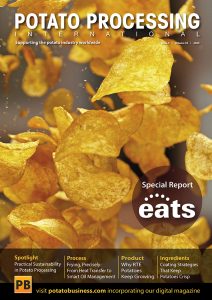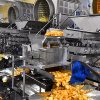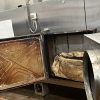Welsh potato growers get latest know-how on Potato Day

Over 50 potato growers gathered at the County Showground in Pembrokeshire to take part at Welsh Potato Day, a technical-focused event that included expert talks and practical workshop sessions.
“More than 1,500 hectares of potatoes are grown in Wales each year”, said organiser and AHDB technical executive, Hannah Goodwin. “That’s why it’s important AHDB comes to the area and we’re really grateful that Puffin Produce have again supported this key event.”
Kicking off proceedings, AHDB consumer insight analyst, Rebecca Hughes highlighted the opportunities up for grabs if businesses can tap into current consumer trends.Kate Cox, marketing manager for AHDB Potatoes, explained how AHDB‘s EU-funded marketing campaign ‘Potatoes: More than a bit on the side’ promotes this agenda. Aimed at 25-44 year old females, the campaign positions potatoes as a relevant and convenient food which is healthy, tasty and versatile.
To support the activity, Miss Cox advised delegates to “shout about potatoes,” with the key messages being that “potatoes are naturally fat free, and a prime source of fibre and potassium.”
Business improvement matters also featured, with Phil Bradshaw (AHDB Potatoes technical executive) showcasing the AHDB Arable Benchmark Model; a key tool to enable growers to understand the profitability of their enterprises and identify areas that could be fine-tuned.
On the introduction of online health and safety training modules produced by AHDB, Bill Quan (Hereford–based potato grower and AHDB Potatoes board member) assured, “With the growing level of mechanisation in arable enterprises making them high risk environments, the security these resources provide to protect the welfare of the farm team is invaluable.
“They are especially helpful with respect to the training needs of seasonal staff, and it’s great how the system provides certification as evidence of due diligence. We cannot afford to be complacent in health and safety matters.”
Offering practical on-farm advice, Dr Bill Parker, AHDB’s technical director for crops, discussed the biology and management of wireworm; an inclusion on the day’s agenda at the specific request of growers in the region.
“There is no magic bullet for wireworm,” cautioned Dr Parker. “It’s about planning and attention to detail. Know your enemy, assess the extent of the problem, and then take action.
“We need to be thinking ahead more than we are at the moment; at least 12-14 months before planting. Making decisions early will greatly help. However if you are facing wireworm problems in an established crop, the advice is to harvest as early as possible to limit damage.”
In an afternoon workshop on cultivation practices, attendees were shown a sneak preview of a new suite of technical summary videos filmed on the Staffordshire Strategic Potato (Spot) Farm. The footage highlighted fuel savings and faster operating speeds to be gained from cultivating at shallower depths, and the findings engaged lively debate about variable soils types and differing farm situations.
Ged Davies of Natural Resources Wales presented on the possibility for areas of Pembrokeshire to be designated as Nitrate Vulnerable Zones (NVZ).
“We want to reduce pollution from agriculture but feel we can do this whilst equally supporting the prosperity of your business,” stated Ged Davies. “We continue to work with farmers to help their compliance with The Nitrates Directive.”
Any decision to be made will soon be out for public consultation, accessible from the Welsh Government website and delegates were encouraged to engage with the process.
“AHDB Potatoes has put on a very useful day, with a good balance of speakers and mixture of topics”, concluded Walter Simon, NFUcounty chairman for Pembrokeshire. ”The session on wireworm gave food for thought following a challenging season of particularly high pressure. I’m also pleased that Natural Resources Wales are here today to update on NVZ designation plans. If there has to be regulation, let’s get it right.”
Related articles:
BLOG: European farmers face crisis















